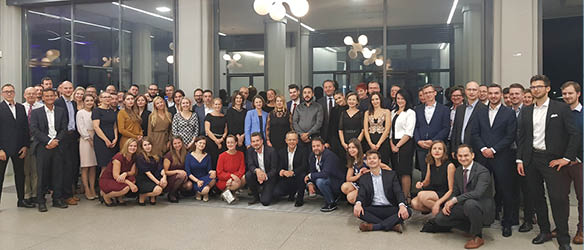The COVID-19 crisis continues to plague much of Europe. To get an overview of its effects across CEE – both on investment in the region and on the legal industry itself – we reached out to the members of Pontes the CEE Lawyers legal alliance, a Regional Sponsor at the upcoming Dealer’s Choice International Law Firm Summit.
CEELM: How is Covid affecting investments in renewable energy, and which CEE markets are particularly attractive in this regard?
Christian Schnell (Poland): The new European Green Deal will stimulate the economy after the COVID-19 crisis. To reach the Net Zero 2050 target, greenhouse gas reduction measures must accelerate significantly before 2030. The EU strategies published since July 2020 provide a technical outlook of how to achieve Net Zero. Electrification of the heat and transportation sectors is key for the future energy system, so the demand for power will increase. Additionally, conventional power generation is becoming very expensive due to increasing prices for emission allowances. The post-COVID-economy will speed up investments in renewables, battery storage, heat pumps, e-mobility, and digitalization, and Poland seems to be the most attractive market in CEE.
CEELM: We’ve heard that the COVID-19 crisis has significantly increased the pace of digitalization in the legal sector. Have you noticed that phenomenon in your business as well?
Bernd Taucher (Austria): What we have seen in the past year is an increase in on-line meetings, negotiations, and conferences, with transactions moving towards all-digitalized project implementation. However, this definitely did not come overnight, and was not primarily driven by the pandemic, although the crisis may have sped it up a little. The prevalence of legal-tech solutions is still more-or-less limited to electronic document management, CRM, co-working tools, and certain cloud-based applications. The legal industry seems to be approaching digitalization cautiously.
CEELM: What issues or phenomena are you paying attention to in each of the markets Pontes the CEE Lawyers operates in at the moment?
Andrej Majernik (Slovakia): A recent – and positive – development in Slovakia is the establishment of the Supreme Administrative Court of the Slovak Republic. It will start to function on August 1, 2021, and in the hierarchy of general courts, it will have a footing equal to the Supreme Court as the court of highest authority in the field of administrative justice. The new and specialized court is expected to improve the quality of jurisprudence and eliminate some of the long procedural delays that have plagued Slovakia. Recognized external professionals, including attorneys, may apply to become Supreme Administraive Court judges. The vacant judicial positions could be taken by lawyers with experience in issues related to governmental interventions into private business activities, and thus possessing a certain sensitivity to the private sector’s needs. Upcoming years will show whether Slovakia will grab or miss this opportunity.
Csaba Polgar (Hungary): In Hungary, a hot topic is the new Foreign Direct Investment control system introduced by the government during the state of emergency, which has raised some concerns. To control foreign investments into Hungarian companies during the pandemic, the government adopted a new Act on the Transitional Rules and Epidemiological Preparedness Related to the Cessation of the State of Danger, which introduced the requirement of consent by the competent minister for transactions having an impact on strategic companies. A company is deemed “strategic” if its main or additional activity falls within the energy, transport, or communications sectors, or other strategic sectors defined in Regulation (EU) 2019/452. The minister’s consent is also required for investments that are equal to or exceed HUF 350 million. In our experience so far, consent is granted for most M&A transactions. However, we are aware that the minister has already denied an acquisition regarding Hungary’s state interest, so it appears that the consent requirement creates a level of uncertainty in M&A transactions that may lead foreign investors to become more cautious with future investments in Hungary.
Victor Gugushev (Bulgaria): We have recently seen a significant increase in interest by investors in renewable resources in Bulgaria and the capacity for development of this sector. The Government has committed to prioritizing green energy, innovation, energy efficiency, and nuclear and gas sources, as the share of “clean” sources in final gross consumption is expected to reach 27.09% by 2030. Bulgaria aims to install 2.65 GW in electricity generation from renewable sources towards meeting that decarbonization goal, mostly in PV and wind plants, while ensuring maximum integration on the market and creating conditions for the development of captive consumption and energy communities. The stimulus is represented in various financial mechanisms and operational and national programs, while the preferential prices and premiums under already concluded contracts will continue. Bulgaria is focused on regional power market integration and trading European-wide through a market coupling.
Ariana Pantea (Romania): Similarly, in Romania, there are great opportunities for green investments if the Government proves its commitment to the European Green Deal and assumes a coherent strategy. Romania’s 2030 RES Target entails commissioning 7GW new generation capacities, so the process to reshape the support framework for renewables has already started. A competitive and cost-effective mechanism is planned, with Contracts for Difference providing stability and revenue security, and greenfield power purchase agreements ensuring the bankability of new RES investments. This mechanism will mainly support mature technologies – especially onshore wind and ground-mounted PV. Despite the pandemic, investors are acting fast, reviving old RES projects or assessing the feasibility of new ones, seeking access to EU funding, and energizing M&A deals. In the near future, we expect to see a rise of solar rooftop projects on industrial and commercial buildings, but large projects will also follow.
Christian Schnell (Poland): “Poland is very attractive for renewables investments due to the high wholesale prices for power, as the price increase of emission allowances has a visible market impact on coal-fired power generation. So power generation by renewables is very competitive. The tender support system awarding a premium to RES generators encourages investment. Due to a strict distance rule implemented in 2016, the pipeline of onshore wind farm projects has dried up, so utility-scale solar PV has become very attractive. However, we expect the government to ease the restrictions of the distance rule. The tender support system might change from 2022/2023 following current regulatory development in Germany implementing tenders for intermittent renewables to be supported by storage.”
Bernd Taucher (Austria): On the other hand, in Austria, the focus is on the development of the current market. To a large extent, Austria depends on Germany’s economic situation, and that of other Central and Eastern European countries. Austria is a wealthy and stable democracy located in the heart of Europe, with one of the highest GDP per capita in the EU, but its economy is highly export-oriented and dependent on foreign trade. The country trades mainly with its neighboring countries, with the manufacturing industry being particularly integrated into Germany’s value chain. Austria’s industry is characterized by numerous small and medium-sized enterprises, with the leading industrial sectors being automotive and chemical, mechanical engineering, electronics, life sciences and environmental technology. Following the outbreak of the COVID-19 pandemic, Austria was severely affected by the decline in trade due to the global economic crisis, and the recovery measures enacted by the Government are the main priority at the moment.
Tomas Dolezil (Czech Republic): In the Czech Republic, we have been witness to a rapid and accelerated digital evolution. Technology was already playing an important role for a long time even before the pandemic, and we are lucky that it was available to us. We just need to fully accept the new tools, show greater flexibility, and learn how to use them effectively in our day-to-day lives. The existing situation has changed how we deliver our legal services, for example. We can see that the home offices and on-line communications have led to a different type of team dynamics than we were used to. We have also observed that on-line meetings – in particular negotiations – are quite surprisingly effective, and that even remotely we can create and keep the necessary momentum.
CEELM: Are Pontes offices engaged in pro bono initiatives? What kind?
Gabor Bebok (Hungary): Across all Pontes offices, pro bono initiatives are vital to our social responsibility policies, based on our shared mission and values. In Pontes Austria, each attorney provides legal assistance to people in need – around five cases per year in the areas of criminal, civil, or administrative law, in addition to providing pro bono legal assistance to refugees. For the past two years, Pontes Slovakia has been defending the right of freedom of expression and information on a pro bono basis for two non-profits: Humanny Pokrok (pushing for a ban on selling eggs from caged hens in supermarkets) and Za Nasu Vodu (which is leading a campaign for clean drinking water). In Hungary, I support the InDaHouse association, which provides education services to children at risk of dropping out of the educational system by helping them with various legal matters. Similarly, Pontes Bulgaria provides pro bono support to the For Our Children Foundation, which advocates for children’s rights. Amid the Covid crisis, the Czech office assisted the Technical University in Prague with the licensing process for emergency lung ventilation equipment and an on-line shop distributing face masks for fair prices in addition to other annual CRS initiatives. Pontes Romania was also all-hands-on-deck in these challenging times, offering legal support to multiple industries, explaining state support measures, aid schemes, and the impact of lockdown on permits and contracts.
This Article was originally published in Issue 8.3 of the CEE Legal Matters Magazine. If you would like to receive a hard copy of the magazine, you can subscribe here.














